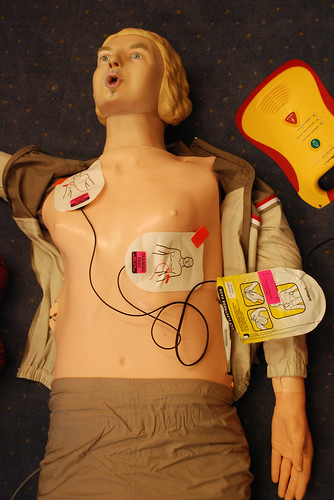Police refer to convenience stores as stop-and-robs and this description fits gas stations as well, so I pay attention to my surroundings, but that's not the greatest safety hazard at a gas station.
Accidental combustion is the greatest risk posted by a gas station, IMHO. Nobody wants to die in a conflagration. Surviving with a massive third degree burn would be torturous, as well.
Last week I pulled into a gas station and noticed that the pump's dispenser nozzle was locked into the on position. Luckily I checked it before I started the gas. I started checking the nozzle after I once saw a guy accidentally spray gasoline all over the side of his truck prior to refueling.
This habit may have saved me from being drenched in gasoline last week, which is toxic and highly flammable (of course). You would have to decontaminate before you got back in your car. Water is the natural decon agent, but you wouldn't want to pollute the sewers and ground water, so I assume you'd need to call the local FD to contaminate you... never had to do it. Knock on wood.
Only morons smoke at gas stations, but I've seen it done before. (Drive away as fast as you can.)
I don't get back in my car during refueling b/c of a risk of static discharge. If you do get back in the car (b/c of cold) be sure to touch a metal surface before putting the gas dispenser nozzle back in the gas pump.
And always turn the car completely off before fueling.
Cross-posted at the Fireside Chat.
Saturday, November 8, 2008
Friday, November 7, 2008
Crime Maps
Crime maps are a useful tool for visualizing crime data. A new service, CrimeReports.com, will send you an individualized crime blotter if your local police or sheriff's department participates.
Thursday, November 6, 2008
Havaria Information Services Alert Map

The Havaria Information Services Alert Map is a visualization tool to increase global disaster awareness (which precedes response).
Friday, May 2, 2008
Information Sharing in a disaster: mobile wikis?
One use of a wiki would be to allow anyone with a Internet capable device (e.g. Blackberries, Iphones, PDA's) to access and share information.
A mobile adapted wiki would seem tailor made for this. One option is Upvise, which has a mobile & web client free to individuals (but also available to businesses) that would be useful for tracking (& thus coordinating)dispersed activities in a disaster.
A mobile adapted wiki would seem tailor made for this. One option is Upvise, which has a mobile & web client free to individuals (but also available to businesses) that would be useful for tracking (& thus coordinating)dispersed activities in a disaster.
Tuesday, April 29, 2008
New Disaster Management Wiki
Just become you can never have enough Web 2.0 tools, I've created a Disaster Management wiki at Wikispaces.
Friday, April 11, 2008
Heart Attacks and AEDs
An Automated External Defibrillators (or AED) is a tool that can help treat heart attacks.
Here's OSHA's conclusion on AEDs in a Technical Information Bulletin.
Amazon even sells AEDs. Many public places have purchased them including airports, malls, and schools. They're getting so affordable that individuals can reasonably purchase them.
Hopefully you'd never need it, but better to have an AED and not need it, than to need an AED....
Here's OSHA's conclusion on AEDs in a Technical Information Bulletin.
The sooner defibrillation is started, the more likely the victim will survive. The optimum time for defibrillation is 3 to 5 minutes after the onset of the cardiac arrest. The AED is a safe, effective, easily learned method of treating victims of cardiac arrest.
Amazon even sells AEDs. Many public places have purchased them including airports, malls, and schools. They're getting so affordable that individuals can reasonably purchase them.
Hopefully you'd never need it, but better to have an AED and not need it, than to need an AED....
Saturday, March 22, 2008
The End of the Blog
Since blog posts are arranged in reverse chronological order, this will be the last blog post if you started late. Your host is a kindly law librarian in St. Paul who loves the snow and volunteers with the Ramsey County CERT team organized through the Ramsey County Sheriff's. In our jurisdiction the CERT teams continue their training with the CCDC or Citizens Civil Defense Corps.
Ramsey County has an umbrella program called VIPS for Volunteers in Public Service.
I'll blog about my training and conference experiences to create an archive for myself and others.
Ramsey County has an umbrella program called VIPS for Volunteers in Public Service.
I'll blog about my training and conference experiences to create an archive for myself and others.
Subscribe to:
Posts (Atom)
